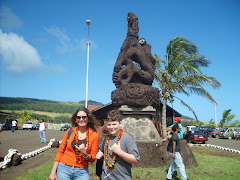Appears that the common theme in our readings is "regions" or place, and humans reaction and interaction with their place. Yi-Fu Tuan's article points out that as early as the 18th century, Hun Lian-Chi gave thought to the effect population would have on the land. On the same note Williams article, "Deforesting the Earth" (2007) states that people have been exploiting forests for centuries for their basic needs and refers to it as, "an economic, not environmental issue." Tuan also mentions that most only look at the surface, that animals judge by "appearance" which is all they need to survive. However, our interaction with what is around us and our pursuit of individual happiness, has gone below the surface. As Tuan states, "Civilization has created beautiful surfaces, but at what cost?" Cultures through time have exploited the environment.
The concept of Bioregionalism brings about a new awareness of the earth and trying to get back to basics, starting with where one lives in realtion to a community and his place. Tied into Parson's article comes the idea of food as mentioned in Pollan's "Obsessed with Nutrition". We have come so far away from just eating to survive, eating what is available in or near the region that we live and consequently have an obsession with eating but not eating the right foods. Pollan says we need to "return to the local and the basic." Bioregionalism? I think so. Not only is it healthier for humans in the long run, it is also perhaps healthier for the environment.
Zelinsky spent years trying to figure out where the south began only to find out that the most distinguishable sign which was key in determining the southern boundary was the use of the mule over the horse for agriculture. Again, this is a regional trademark. He points out surface things which helped formulate his boundaries, type of construction, wells, architecture, town centers, etc., all examples of people using the regional resources at their disposal, but there was such a vide variety that one could not really characterize exactly where the south began due to these variations. Yet the one thing that pulled it all together was the use of one animal by a group or a culture of people.
Cultures have done things collectively for their survival that, in their judgment may have been right at the time, without consideration of long term effects on their ancestors.
Bottom line is we need to begin focusing on our own space or region on this planet and the impact our actions have on our place. We need to start thinking as a community and take care of our own "place" before we can reach out globally.
Rapa Nui

Vacation of a Lifetime
Tuesday, January 29, 2008
Subscribe to:
Post Comments (Atom)

No comments:
Post a Comment